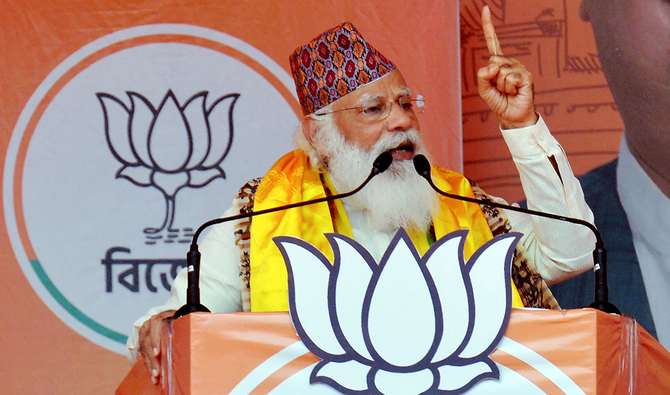NEW DELHI: Indian Prime Minister Narendra Modi has been accused of complacency and missteps in the handling of the pandemic by the country’s main opposition party, after six states reported a shortage of coronavirus vaccines and more than 145,000 new infections were recorded on Saturday.
The Congress Party also blamed the ruling Bharatiya Janata Party (BJP) for prioritizing “vaccine diplomacy” by exporting vaccine doses instead of reserving them for domestic use.
“The Modi government has mismanaged the situation – exported vaccines and allowed a shortage to be created in India,” Congress Party president Sonia Gandhi said during a special meeting on Saturday to address the COVID-19 crisis.
“We must focus on India’s vaccination drive first and foremost, then only export vaccines and gift them to other countries.”
She emphasized the need for “responsible behavior” and adhering to all laws and COVID-19 regulations “without exception.”
But the government insisted there were enough vaccines in stock, accusing the opposition of “playing politics” even as India grappled with a deadly second wave of infections.
“There is no shortage of vaccines,” BJP spokesperson Sudesh Verma told Arab News, adding that state governments were following the “procedure laid down by the center.”
Six opposition-ruled states said earlier this week that they were running out of vaccines and would be forced to discontinue the vaccination drive if the central government did not send supplies.
One of the worst affected states is western India’s Maharashtra, which recorded 58,993 new cases on Saturday out of the nationwide total of 145,384.
“There are 108 vaccines centers in Mumbai, but most of them have been closed due to a lack of vaccines,” Mumbai Mayor Kishori Kishore Pandekar told Arab News.
“The number of doses we have cannot last more than two days. If this is the situation in India’s financial capital Mumbai, imagine the case in remote areas of the state.”
Pune, one of Maharashtra’s biggest cities, has also run out of vaccines.
“We have not been vaccinating since Thursday in Pune, and we don’t know when the next lot of doses will arrive in the city,” Dr. Avinash V. Bhondwe, president of the Indian Medical Association’s Maharashtra wing, told Arab News.
The eastern state of Odisha has reported a shortage in doses, leading to the closure of 700 vaccination centers, according to media reports.
Verma said the current situation was due to the “desperate” measures taken by state governments.
“People above 45 years was the target group for the vaccination (drive). Some state governments are getting desperate, and they want to give vaccines to one and all. This is not possible for a (country with a) size like India. Vaccine production and export needs have been calibrated.”
But the BJP’s explanation did not satisfy Pankaj Vohra, from the New Delhi suburb of Noida, who went to hospital on Friday for his second jab but could not get vaccinated due to a shortage.
“A day before going to the hospital, I got a confirmation that I should come for the second dose,” he told Arab News. “But when I reached the hospital, I was told that the Covishield vaccine was available and not Covaxin. If the government cannot fulfil its domestic demand, why is it exporting vaccines?”
India has allowed permission for the emergency use of Covishield – the local name for the Oxford-AstraZeneca vaccine produced by the Pune-based Serum Institute of India – and Covaxin, directed by Bharat Biotech in the south Indian city of Hyderabad.
It launched its vaccination drive on Jan. 16 and has inoculated 94 million people, far below the initial target of 300 million.
Only 12.5 percent of the 94 million have received the second dose, based on an advisory by the Health Ministry, which recommends a 28-day gap between the first and second dose.
“The government did plan the vaccination drive,” Dr. Amar Jesani, a Mumbai-based public health expert, told Arab News. “Most of the developed countries made arrangements that they get enough doses of vaccines when they need them, but the Indian government did nothing about it.”
He wondered why just two companies in India were producing vaccines, and suggested the government use a compulsory licensing policy and allow other local companies to produce them.
“That way, you could have a large number of vaccines available,” he added.
There has been increased demand for COVID-19 vaccines in the past few weeks following a leap in cases, with Saturday’s daily infections rising by a record for the fifth time this week.
Last week experts told Arab News that India was on its way to becoming the “ground zero and global epicenter” for the coronavirus outbreak.
“The rising number of cases is due to the government’s failure to implement preventive measures,” Jesani said. “Political leadership is unhindered in their political campaigns addressing huge gatherings without following any COVID-19 protocol.”
Bhondwe urged the government to allow more companies to produce vaccines in India and to allow more foreign vaccines to come to India.
“People are in a state of panic, and they see some hope in vaccines. The government should not disappoint its people.”
























